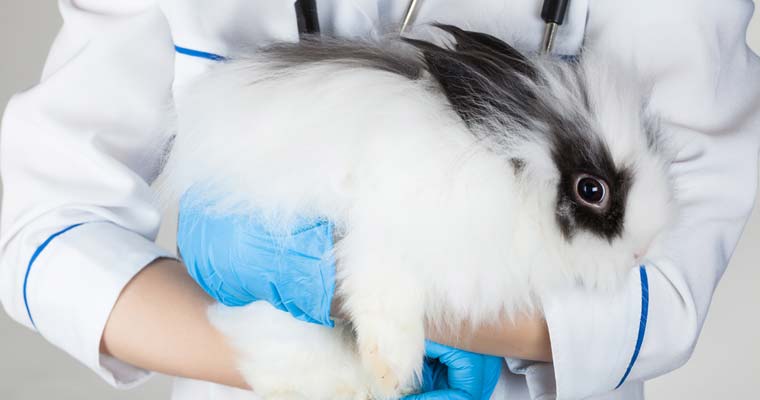
We always advise contacting a vet!
Not only will you find the meaning of these terms, but there will be information offered for various home-treatments of each of these problems. We will go over tips to help keep a rabbit hydrated, how to induce labor when it becomes necessary to do so, what to do if your rabbit is injured, and how to trim teeth when there is a dental problem.
We will discuss what to do if your rabbit stops eating, how to tell if your bunny is in pain, and we will even cover how to know when it becomes more humane to Euthanize.
Some of the most common rabbit health problems
Because we, at Rabbit Pedia care about helping you, our experts have combined resources to provide our viewers with the most common ailments and diseases of rabbits. Clicking on the name of the problem will open up a full page document including the symptoms, cause, treatment, and when possible – ways of preventions for each problem.
- Abscess
- Bladder sludge
- Bloat
- Broken leg
- Coccidia
- Constipation
- Cuts / Wounds
- Ear mites
- Enteritis (BacterialL or Mucoid)
- Fly strike
- Fur mites
- GI Stasis
- Heat stroke
- Hyptohermia
- Malocclusion
- Mastitis (Cystic or Septic)
- Pasteurella(Snuffles)
- Sore hocks
- Split penis
- Weepy eye
- Wet dewlap
- Wool block
- Wry neck
Pocket or blister filled with thick white pus.
Urine is very thick, like a paste, & dries at a consistency of cake-batter.
Rabbit will stop eating/drinking & will become listless, stomach will swell up & become gassy, & will present with constipation or diarrhea.
Injury causing bone to be broken.
May present with constipation or diarrhea with / without presence of mucous, also stops eating/drinking, listless, loss of weight, swelled belly – commonly effects weanlings and older rabbits alike.
Bowel blockage causing rabbit to be unable to defecate, may present with swelled belly, lethargy, refusal to eat/drink.
Due to injury.
Rabbit may shake or scratch at ears, inner ears will have appearance yellow or brownish color substance.
Buildup of gas in stomach, very painful, loss of appetite, diarrhea, dehydration, more common in weanlings beginning to eat pellets, droppings will be covered in jelly-like mucous, may grind teeth &/or squeal from the pain.
Insects lay eggs on damp/wet, soiled, or infectious skin… the eggs hatch.
Appearance of dry skin or dandruff, usually begins at the base of shoulders, but quickly spreads across the body, may have missing patches of fur, rabbits may scratch & may cause sores from scratching.
Very small or no fecal pellets with possible presence of clear or yellowish mucous, may have swelled stomach, also lethargy, refusal to eat/drink, dehydration, very loud gurgling in stomach – or complete silence (absence of normal gut sounds).
Caused by excessive heat, usually at or above 85*F, or lack of air/ventilation, difficulty breathing, head tilted up – gasping for air, muzzle may be damp or wet (not always).
Low Body Temperature – Below 100* is Serious!
Teeth are overgrown &/or split.
Presence of cysts in /around teats, alert, bright, and not in pain, may have blood in urine, dehydration and fever.
Sneezing with discharge from nose &/or eyes, fur on sides of front paws will also often be wet or matted.
First signs is loss of fur & red skin that will progress to calluses & sores.
Buck’s genital area it will visibly be protruding straight out with a split down the center – as a doe’s genitals look – but the protrusion is often slightly curved at the end.
Discharge of one or both eyes, wet fur or loss of fur around eye(s).
Does will sometimes drag or lay their dewlap into their water-dishes causing the fur to become wet, which can cause the skin to turn green & have an odor present.
Lack of appetite, lethargy, change in feces – may be presence of several droppings ‘lined’ together resembling string a beads.
Rabbits head will physically twist to one side, this will progress very quickly, will not be able to eat or drink on its own, will not be able to stand / will roll onto its side when it attempts to move eye that is facing downwards will not be able to close.
***DISCLAIMER: *DISCLOSURE:
This information is not to be used in replacement of a certified Veterinarian. Every medication of any form has the possibilities of side-effects. Those side-effects, & the results of them, may vary greatly from rabbit to rabbit & all may be affected by various other elements such as other medications, foods, age & health, & other things. With this said, the statements here-in are not written as an absolute answer or guarantee; these are simply common treatments used by those who have experienced successful results with such, but in no way guarantee the same results for every situation. Furthermore, we do not claim to be vet’s, nor are we in any way liable or responsible for any results, be it positive or negative, due to the use of the information stated within. Use of any information offered is done so fully at your own risk.
(Please note: we are not and we do not in any way claim to be veterinarians; no information offered should be considered as that which has came from a professional veterinarian, and we are in no way liable for any information noted. We always advise contacting a veterinarian who is licensed and is experienced in rabbit care. Furthermore, all information contained within this section is without guarantee of success; all information is gained from experienced rabbit-breeders who have tried these home-treatments with successful results – however – note that what may work for one rabbit, may not work for all. *Any treatments noted that you choose to use, is done so at your own liability and risk!!!)




